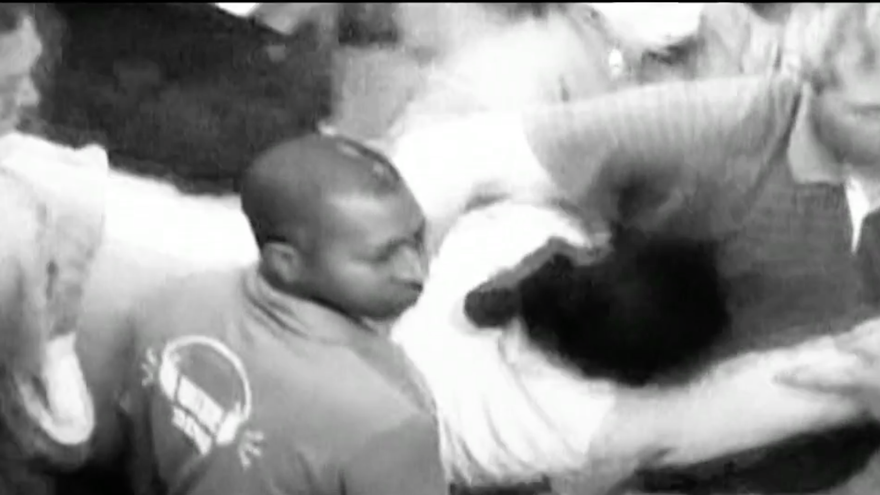
![]() EFE, via 14ymedio, Jorge I. Pérez, Miami, December 9, 2021 — The documentary “Los Sin Derechos” [Those Without Rights], “an irrefutable denouncement” against the Cuban regime told by about twenty dissidents, including an activist who was subjected to simulated execution, debuts in Miami for international Human Rights Day.
EFE, via 14ymedio, Jorge I. Pérez, Miami, December 9, 2021 — The documentary “Los Sin Derechos” [Those Without Rights], “an irrefutable denouncement” against the Cuban regime told by about twenty dissidents, including an activist who was subjected to simulated execution, debuts in Miami for international Human Rights Day.
Directed and edited by filmmaker Daniel Urdanivia, Los sin derechos intertwines archival images, such as those of executions from the early years of the so-called Cuban Revolution, with testimonials from different time periods.
The first to appear is Ricardo Bofill, founder in 1976 of the Cuban Pro Human Rights Committee (CCPDH), who died in Miami in 2019.
“In many countries human rights are violated, the difference in Cuba is that (…) it is carried out from an institutional angle; it is part of the laws,” begins Bofill in the film.
Following Bofill, about twenty writers, journalists and former political prisoners offer their testimonials of why they were taken to prison and how they were treated by their jailers.
One of them is Annete Escandón, admitted to a psychiatric hospital where, as she tells it, they gave her electroshocks “in a very recent C-section wound.”
“It was necessary to collect, in a graphic manner, the testimonials of people who have suffered the violations of their rights as citizens,” Pedro Corzo, the documentary’s producer and founder in 1999 of the Institute of Cuban Historical Memory Against Totalitarianism, tells Efe.
“They represent different social strata and different generations, not biological as much as political,” expanded Corzo, also a journalist.
The showing of Los sin derechos, which lasts over an hour and includes some images filmed on mobile phones, will be shown on Thursday, the eve of Human Rights Day, during an event in memory of Ricardo Bofill. It is one of the 15 documentaries created by the institute.
For 78-year-old Corzo, who was “jailed for eight years for assault against State Security,” Bofill “provided context and concept to the reality of human rights violations in Cuba.”
“He was capable of synthesizing the idea and sharing it,” he said about the dissident who Amnesty International adopted as a prisoner of conscience in 1985.
In an open letter written in 1986, Bofill said: “We do not have anything to do with the CIA. We do not participate in violent acts. We have no weapons besides our word. And we will use it while we have a breath of life remaining.”
For Corzo, the toughest testimonial, for the cruelty it contained, is that of Gloria Argudín, “a very brave, older woman”, who suffered a simulated execution.
“I met a man who was subjected to simulated execution eight times, and he said it was one of the most cruel experiences one could have,” comments the producer.
“Near dawn they took me, barefoot. They placed me in front of the hole, with a machine gun they pointed at me and said, ’if you don’t talk we will kill you.’ I told them, ’kill me, it seems unreal you were born of a woman,’ narrates Argudín into the camera.
“She, who we expect will attend the showing, is one of the first women who took up arms against the Castro dictatorship in the Escambray,” says the producer.
José Ignacio (Pepín) Rivero, the director of Diario de la Marina, which was confiscated, narrates how the rebels “broke the copper cylinders that would be placed on the printing presses.”
“The first type of censorship was the media: to tell horrors to those whose opinion was against the revolution,” comments Rivero, who died in exile.
Rolando Cartaya, a former journalist for Juventud Rebelde, the daily created by Fidel Castro in 1965, told Efe that the documentary “bears a renewed validity these days.”
“The Cuban Government, discredited by the violent repression of July 11th, once again unleashed mobs organized by the political police against this generation of young people who laugh in its face,” comments Cartaya, who “paid” two years in prison for denouncing the “acts of repudiation” organized by the State in 1980.
“I wrote a letter denouncing the vestiges of fascism of that time. A traitor turned it in. I was summoned to the newspaper and from there they took me to Havana’s Central Park where colleagues and friends hung a sign and beat me,” recalled Cartaya, another interviewee in the documentary, from Miami.
According to a report by Prisoners Defenders shared this past Tuesday, 805 political prisoners and convicts in Cuba have made its list in the past 12 months. The NGO based in Spain has been able to confirm that 562 cases are related to the repression of July 11th in Cuba.
Corzo, who has produced other historical documentaries such as Zapata vive [Zapata Lives] and Boitel, muriendo a plazos [Boitel, Dying in Installments], insisted that “the historical memory does not involve working with relics nor with third-party accounts, but rather with the direct experiences of people.”
Translated by: Silvia Suárez
____________
COLLABORATE WITH OUR WORK: The 14ymedio team is committed to practicing serious journalism that reflects Cuba’s reality in all its depth. Thank you for joining us on this long journey. We invite you to continue supporting us by becoming a member of 14ymedio now. Together we can continue transforming journalism in Cuba.
